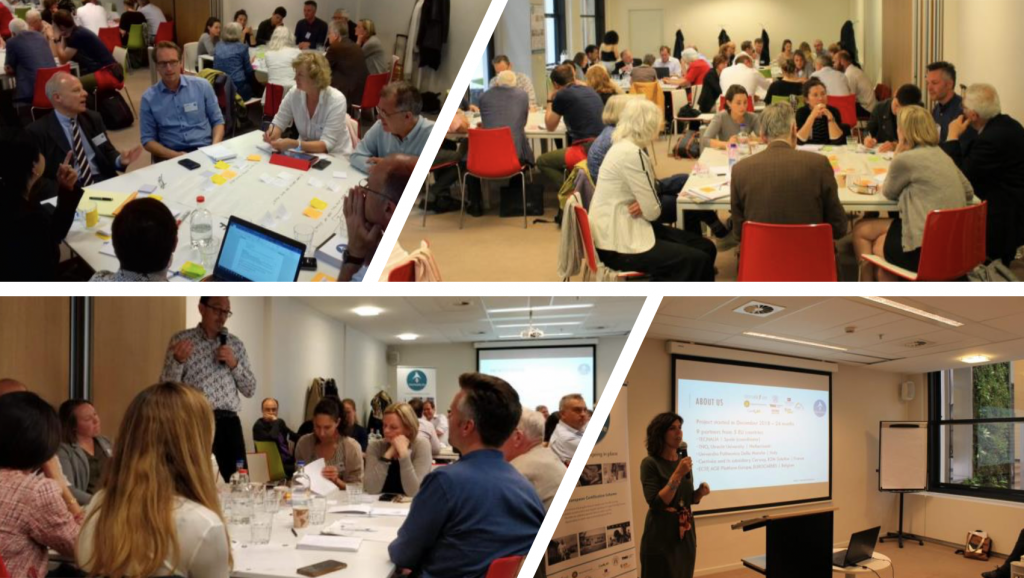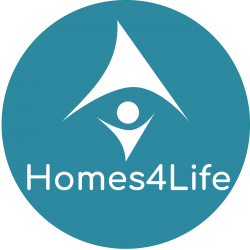Homes4Life Deliverable D2.2 – Stakeholder Workshop, Event report – is now available for download.

Executive Summary
Homes4Life (H4L) project aims at addressing the challenge of ageing in place for older people, in a living environment that corresponds to needs and preferences that evolve over time. It will do so by contributing to the development of a new European certification scheme (CS), based on an inspirational and realistic long-term vision of people’s needs and requirements in a holistic life-course approach. It will also help developing better living environments integrating construction and digital solutions where this is beneficial.
As part of Task 2.2, H4L partners have organised a “Stakeholder workshop” which objective was to expose the first results obtained in Tasks 2.1, 2.3 and 2.41, but also to receive all the opinions, comments and inputs from the audience. H4L partners will use this material to fine-tune their research, to understand each stakeholder’s concerns, etc., in order to draw the most coherent, inclusive and functional CS.
The workshop gathered 58 participants in Brussels, among them expert members of the H4L expert board and stakeholders from a wide array of sectors (older people networks, public authorities, research institutes, consulting firms etc.) all across the EU. It was divided in 3 sessions covering the different parts of the preliminary work:
- Session 1: Age-friendly housing today and tomorrow
- Session 2: Vision 2040 for age-friendly environment in Europe: potential scenarios and the stakeholder roles
- Session 3: From taxonomy to certification – priorities and concerns.
The inputs of the participants have been gathered during roundtable sessions by Homes4Life partners and compiled in this report. Partners especially expected feedbacks on the following aspects:
- Level of awareness of stakeholders
- Propositions of success factors and barriers for the implementation of the CS
- Comments about the Vision 2040 already prepared by the consortium
- Input on what the role of each stakeholder should be in the definition and
- implementation of a CS on age-friendly housing (AFH)
- Priority areas and requirement for the development of a taxonomy and CS
- Implications for the operational characteristics of the CS.
Even if many diverse inputs have been provided, a few of them seem to particularly stand out. They are briefly commented below2.
- An overall positive feedback was received on the idea of a CS, the first works carried out and the vision 2040. To be noted though: the terminology should be clarified in order to avoid confusion between e.g. “vision”, “certification scheme” and “taxonomy”.
- The level of awareness around these topics seems to be growing in Europe: ageing population and AFH is a pan European matter. Significant differences in the context and management can be noticed among countries or regions though.
- Most initiatives seem to emerge at a local level, apart from a few initiatives from front runners. Many local projects across Europe have been shared by attendees.
- The public sector is seen as the principal driver to change practices, to disseminate on the topic of age-friendliness, to implement related-policies, but also to share on the potential benefits of a CS.
- However, oppositions were observed on regulations. Most stakeholders consider they are needed to draw standards and encourage housing adaptation. But some were opposed to such CS: they do not welcome an extra regulation, whereas their local requirements/standards/CS are already working. They can see them as potential interferences, and consider design guidelines potentially more efficient.
- Though all stakeholders have a role to play in the improvement of the situation, most seem open to exchange and share good practices, for instance through adapted new platforms.
- The potential lack of funding is a main concern for stakeholders. A financial system and incentives must be found, in order to launch projects. Tenants and landlords especially might not have enough resources to start renovation works on their properties.
- The lack of information/knowledge is also a major barrier to the adaptation of housing. Not only from the tenant or landlords, but also from the construction sector, architects, etc.
- Technologies and ICT might bring answers or new possibilities. Therefore, they must be fully integrated into the CS. Provided that the readiness and savviness of end users is taken into account, as well as their affordability.
-
Concerning the form of the CS, four notions seemed to particularly stand out for most participants:
- holistic approach, covering all parameters and opinions
- simplicity, enabling all stakeholder to implement it with little effort and resource
- adaptability, for all kinds of buildings, owners, uses, etc.
- inclusiveness, so that all stakeholders and inhabitants can participate. Psychological factors concerning older people (e.g. acceptation of ageing) should be considered in this reflexion.
With these feedbacks and discussions, the Homes4Life consortium will move forward to the next steps of the project. The collaboration with the stakeholder group will contribute to the development of the KPIs framework.

